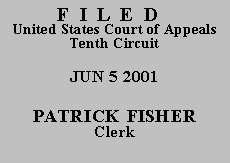

| UNITED STATES OF AMERICA,
Plaintiff-Appellee, Defendant-Appellant. |
No. 00-3358
(D.C. No. 00-CR-10082-MLB) (Kansas) |
Relying on Apprendi v. New Jersey, 530 U.S. 466, 490 (2000), and United States v. Jones, 235 F.3d 1231, 1236 (10th Cir. 2000), Mr. Orantes-Mendez argues his enhanced sentence is invalid because the fact of the prior conviction was not specified in his indictment. This argument disregards the explicit language of Apprendi, which limited its application to facts "other than a prior conviction." 466 U.S. at 490. Prior felony convictions remain a valid basis for sentencing enhancements under Almendarez-Torres v. United States, 523 U.S. 224 (1998). See also United States v. Martinez-Villalva, 232 F.3d 1329, 1331-1332 (10th Cir. 2000) (prior felony remains sentencing factor for section 1326 offense after Apprendi).
Mr. Orantes-Mendez acknowledges these holdings and asserts that he makes his current argument in order to preserve the issue for further appeal. Nevertheless, based upon existing law his appeal must be DENIED.
ENTERED FOR THE COURT
Stephanie K. Seymour
Circuit Judge
*.After examining appellant's brief and the appellate record, this panel has determined unanimously that oral argument would not materially assist the determination of this appeal. See Fed. R. App. P. 34(a)(2) and 10th Cir. R. 34.1(G). The case is therefore submitted without oral argument. This order and judgment is not binding precedent, except under the doctrines of law of the case, res judicata, or collateral estoppel. The court generally disfavors the citation of orders and judgments; nevertheless, an order and judgment may be cited under the terms and conditions of 10th Cir. R. 36.3.